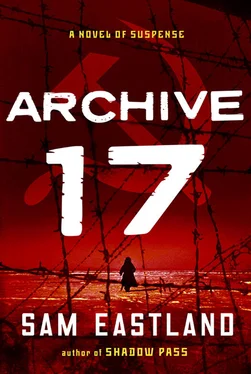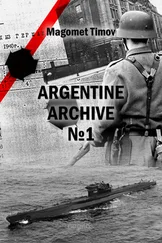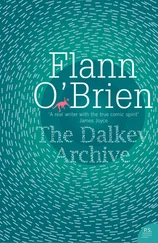Sam Eastland - Archive 17
Здесь есть возможность читать онлайн «Sam Eastland - Archive 17» весь текст электронной книги совершенно бесплатно (целиком полную версию без сокращений). В некоторых случаях можно слушать аудио, скачать через торрент в формате fb2 и присутствует краткое содержание. Жанр: Исторический детектив, на английском языке. Описание произведения, (предисловие) а так же отзывы посетителей доступны на портале библиотеки ЛибКат.
- Название:Archive 17
- Автор:
- Жанр:
- Год:неизвестен
- ISBN:нет данных
- Рейтинг книги:3 / 5. Голосов: 1
-
Избранное:Добавить в избранное
- Отзывы:
-
Ваша оценка:
- 60
- 1
- 2
- 3
- 4
- 5
Archive 17: краткое содержание, описание и аннотация
Предлагаем к чтению аннотацию, описание, краткое содержание или предисловие (зависит от того, что написал сам автор книги «Archive 17»). Если вы не нашли необходимую информацию о книге — напишите в комментариях, мы постараемся отыскать её.
Archive 17 — читать онлайн бесплатно полную книгу (весь текст) целиком
Ниже представлен текст книги, разбитый по страницам. Система сохранения места последней прочитанной страницы, позволяет с удобством читать онлайн бесплатно книгу «Archive 17», без необходимости каждый раз заново искать на чём Вы остановились. Поставьте закладку, и сможете в любой момент перейти на страницу, на которой закончили чтение.
Интервал:
Закладка:
“Not all of it,” replied Pekkala. “How much gold does one man really need?”
The train was close now.
Worried that he might not reach the locomotive before it passed, Gramotin lumbered down the steep slope. Half running, half falling, swamped with snow, he tumbled out at last onto the rails.
The engine slowed as it rounded a curve on the tracks. Then its motor roared, regaining speed and trailing a cloud of snow dust which rose like wings behind the train.
Gramotin raised his rifle above his head and began waving his arms back and forth, all the while shouting at the top of his lungs to attract the attention of the driver.
The engine changed pitch suddenly. The great machine was slowing down. They had seen him. The sound of brakes filled the air with a ringing clash of steel.
As the train came to a stop, Gramotin stared in awe at the overlapping plates of armor, the heavy machine guns jutting from their turrets and the ice-encrusted battering ram mounted in front of the driver’s compartment. Painted on the front of the engine, he glimpsed a name in large white letters. Even though Gramotin could barely read or write, it took him only a moment to spell out the word ORLIK.
Gramotin swore he must be dreaming, but the shaking of the ground beneath his feet proved otherwise. “No,” he mumbled. “Not you. Not again!” He could almost hear the terrible clanking rattle of the Czech machine guns as they strafed the foxholes where he lay with his platoon. He flinched as he recalled the whip-crack sound of bullets passing just above his head. He smelled pine sap from the gashed trees, mixing with the burnt-hair reek of cordite from the guns. He pressed his hands against his ears, trying to block out the terrible noise of bullets striking bodies, like that of a cleaver hacking into meat. Gramotin closed his eyes as tightly as he could, in a last, desperate attempt to banish these visions from his skull, but when he looked again, the train was even closer than before.
Convinced that his nightmares had finally sprung to life, the sergeant turned and fled.
“Go!” said Pekkala. “There isn’t much time.”
Lavrenov did not hesitate. Snatching up a gold bar in each hand, he vanished into the forest.
But Tarnowski had not moved.
“You must leave now!” urged Pekkala.
“I saw what happened,” said Tarnowski, “out there on the pond. Kolchak was going to kill you.”
Pekkala nodded. “If it hadn’t been for that gunman on the cliff …”
“That gunman didn’t shoot the colonel. I did.”
The revelation stunned Pekkala. “But why?” he demanded.
“I heard what he was planning to do,” explained Tarnowski. “I don’t care if Kolchak wanted a fight with Stalin. Unlike you and Captain Ryabov, I have no love for Russia or mankind. This whole country can go up in flames as far as I’m concerned.”
“Then why did you ever become a soldier?”
“Because I was good at it! War was my job, just as police work was yours, and I expected to be paid for doing it. I am owed, Pekkala, not only for the expedition but for every day I spent at Borodok, especially since we never should have been there! If the colonel hadn’t insisted on bringing an entire wagonload of treasure with us when we departed from the city of Kazan, instead of leaving all three wagons behind as we should have done, we could have outrun the Bolsheviks. At least we would have saved ourselves. Instead, I ended up in Borodok, along with the rest of Kolchak’s men. My share of the gold is fair wages for spending half my life in that hellhole. And I’ll be damned if Kolchak was going to spend it on another war.”
“Then take what you can and go now!” pleaded Pekkala.
Tarnowski nodded once. “Very well, Inspector, and thank you. Perhaps one day I’ll see you on the other side.”
Without another word, Pekkala turned and set out across the frozen pond towards the tracks. Behind him, hidden in the canopy of pines, he heard the dull ring of gold bars knocking together. After that came silence.
The train had stopped beside the cliff. The locomotive stamped and snorted, like a bull getting ready to charge. Then it belched out a cloud of steam as the driver released pressure from the engine.
Twenty paces away, Pekkala stood on the tracks, waiting to see what they’d do.
Now a man emerged from the haze. He was tall and thin, with a particular loping stride.
Only when Kirov stood right in front of him did Pekkala believe his eyes. “Kirov!” he shouted.
“Inspector,” said Kirov, trying to hide his astonishment at the sight of Pekkala’s filthy clothes, scruffy beard, and uncombed hair. “Where are the kidnappers?”
“Kidnappers?” asked Pekkala.
“The men who took you hostage when they escaped from the camp.”
“Ah, yes,” Pekkala replied hastily. “They fled when they saw the train coming.” Now Pekkala raised his head and squinted at the top of the cliff. “And where are the soldiers who kept them pinned down?”
“There are no soldiers, Inspector. Only me, and the driver of the train.”
“But somebody was shooting at us.”
“We did see a man on the tracks, but he ran away when we slowed down. Whoever he was, the train must have scared him off.” Kirov nodded towards Kolchak, whose body still lay sprawled upon the frozen pond. “Who is he?”
“That,” replied Pekkala, “is Colonel Kolchak, the last casualty of a war which ended twenty years ago. And from what I hear, Stalin intends to make a casualty of me as well.”
“That will be true for both of us, Inspector, if we do not bring him the thirteen cases of gold he says are still missing from the Tsar’s Imperial Reserves.”
“Thirteen?”
Kirov nodded. “That’s what he said. Five thousand pounds of it in all.”
Stalin has somehow miscalculated the amount, thought Pekkala. “How did he come up with that number?”
“They had an informant,” explained Kirov. “A groundskeeper at Tsarskoye Selo. He saw Colonel Kolchak departing from the estate and even managed to count the number of crates on the wagons Kolchak brought with him.”
As Pekkala thought back to that night, he suddenly grasped what must have happened. The groundskeeper had not realized that the third cart had broken down. He had only watched the first two carts departing. By the time the third had been repaired, the groundskeeper was already on his way to report what he had seen. Stalin must be under the impression that there were fifty cases in all, when in fact there were seventy-five. There were not thirteen cases missing. There were thirty-eight. Subtracting the three cases that Kolchak used for bribes along his route, that still left thirty-five cases of gold, and not five thousand pounds but more than thirteen thousand.
“Those cases are down there in the woods,” said Pekkala. “I will go and fetch them now.”
“Let me help you, Inspector.”
“No.” Pekkala held up one grubby hand. “As the Tsar once said to me, this is a task I trust to no one else.”
The poor man has been driven insane, Kirov thought to himself, but he smiled gently and rested a hand upon the shoulder of Pekkala’s dirty coat. “Very well, Inspector,” he said comfortingly. “If you insist.”
It took Pekkala two hours to carry the ingots from the forest. In that time, he barely spoke, methodically shuffling back and forth between the train tracks and the clearing.
Kirov and Deryabin watched Pekkala struggling under the weight of the ingots, which he carried three at a time. The only assistance Pekkala accepted was for the two men to take the gold from his hands and stack it inside the train compartment.
“Why won’t he let us help him?” asked Deryabin, when Pekkala had once more disappeared through the reeds and into the clearing on the other side.
Читать дальшеИнтервал:
Закладка:
Похожие книги на «Archive 17»
Представляем Вашему вниманию похожие книги на «Archive 17» списком для выбора. Мы отобрали схожую по названию и смыслу литературу в надежде предоставить читателям больше вариантов отыскать новые, интересные, ещё непрочитанные произведения.
Обсуждение, отзывы о книге «Archive 17» и просто собственные мнения читателей. Оставьте ваши комментарии, напишите, что Вы думаете о произведении, его смысле или главных героях. Укажите что конкретно понравилось, а что нет, и почему Вы так считаете.











